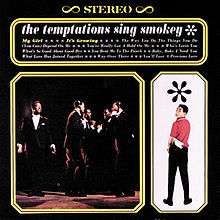The Temptations Sing Smokey
| The Temptations Sing Smokey | ||||
|---|---|---|---|---|
 | ||||
| Studio album by The Temptations | ||||
| Released | March 22, 1965 | |||
| Recorded | 1964-1965 | |||
| Genre | Soul, Doo-wop | |||
| Length | 33:21 | |||
| Label | Motown | |||
| Producer | Smokey Robinson | |||
| The Temptations chronology | ||||
| ||||
| Singles from The Temptations Sing Smokey | ||||
|
||||
| Professional ratings | |
|---|---|
| Review scores | |
| Source | Rating |
| Allmusic | |
| Entertainment Weekly | (A)[2] |
The Temptations Sing Smokey is the second studio album by The Temptations for the (Motown) label, released on the Gordy Records subsidiary (G 912) in 1965.[3] As its name implies, it is composed entirely of songs written and produced by Smokey Robinson, and several other members of the Miracles as well.
Several of the songs are covers of songs Robinson produced for the Miracles or Mary Wells, while the rest were originally recorded by The Temptations. Among these are three successful hit singles, starting with "The Way You Do the Things You Do", which featured Eddie Kendricks on lead vocals. The next two songs feature lead vocals by new Temptation David Ruffin: "It's Growing" and the group's signature song, "My Girl".
Not included are two singles which predate these two singles, "I'll Be in Trouble" and "Girl (Why You Wanna Make Me Blue)" (whose b-side, "Baby, Baby I Need You", is here). These songs would be included on the next Temptations album, The Temptin' Temptations. A third hit single, "The Way You Do the Things You Do", is present here, although it was also issued on the previous Temptations album, Meet the Temptations.
Track listing
Superscripts denote lead singers of each track: (a) David Ruffin, (b) Eddie Kendricks, (c) Paul Williams, (d) Melvin Franklin, (e) Otis Williams, (f) Temptations ensemble.
All selections produced by Smokey Robinson.
Side one
- "The Way You Do the Things You Do" (Smokey Robinson, Bobby Rogers) b
- "Baby, Baby I Need You" (Robinson) f, c, b
- "My Girl" (Robinson, Ronald White) a
- "What Love Has Joined Together" (Robinson, Rogers) b
- "You'll Lose a Precious Love" (Robinson) a, d
- "It's Growing" (Robinson, Warren Pete Moore) a
Side two
- "Who's Lovin' You" (Robinson) a
- "What's So Good About Good Bye" (Robinson) b
- "You Beat Me to the Punch" (Robinson, White) c
- "Way Over There" (Berry Gordy, Jr., Robinson) b
- "You've Really Got a Hold on Me" (Robinson) b, a, c
- "(You Can) Depend on Me" (Gordy, Robinson) b, e
Unreleased recordings from the "Sing Smokey" sessions:
- "What's Easy for Two Is So Hard for One" (Robinson) c
- "Happy Landing" (Robinson, White) b
Both these songs have subsequently been released.
Personnel
- David Ruffin: vocals (all tracks except "Baby, Baby I Need You")
- Eddie Kendricks: vocals
- Paul Williams: vocals
- Melvin Franklin: vocals
- Otis Williams: vocals
- Elbridge "Al" Bryant: vocals ("Baby, Baby I Need You")
- The Andantes: background vocals ("It's Growing")
- Smokey Robinson: producer, Album executive producer
Chart and singles history
| Title | Information |
|---|---|
| "The Way You Do the Things You Do" |
|
| "Baby, Baby I Need You" (recorded 1963; b-side of "Girl (Why You Wanna Make Me Blue)") |
|
| "My Girl" |
|
| "It's Growing" |
|
| "You'll Lose a Precious Love" (b-side of "Ain't Too Proud to Beg") |
|
| Name | Chart (1964–1965) | Peak position |
|---|---|---|
| The Temptations Sing Smokey | U.S. Billboard Pop Albums | 35 |
| The Temptations Sing Smokey | U.S. Top R&B Albums | 1 |
| "The Way You Do the Things You Do" | U.S. Billboard Pop Singles | 11 |
| "The Way You Do the Things You Do" | U.S. CashBox R&B Singles | 1 |
| "Baby, Baby I Need You" | U.S. Billboard Pop Singles | - |
| "My Girl" | U.S. Billboard Pop Singles | 1 |
| "My Girl" | U.S. Billboard R&B Singles | 1 |
| "It's Growing" | U.S. Billboard Pop Singles | 18 |
| "It's Growing" | U.S. Billboard R&B Singles | 3 |
| "What Love Has Joined Together" | U.S. Billboard Pop Singles | |
| "What Love Has Joined Together" | U.S. Billboard R&B Singles | |
- Note: There was no Billboard R&B singles chart from November 1963 until January 1965. Most discographies include R&B information from Cash Box magazine to fill in the gap in the R&B chart, as is done here with the 1964 releases.